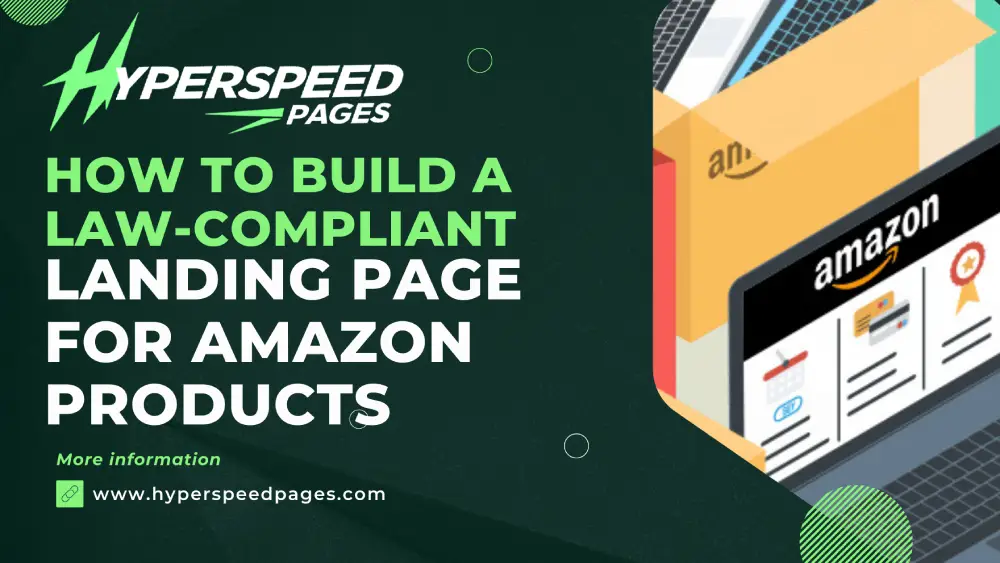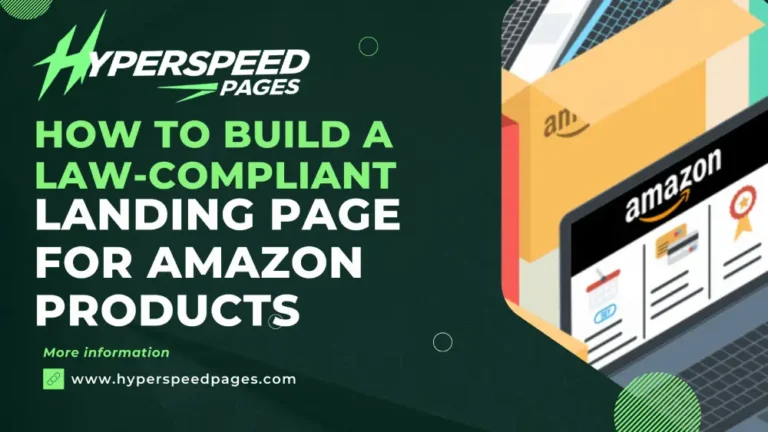
Building a product landing page requires more than just aesthetic design, compelling copy, and a call to action. Adhering to legal standards is critical to ensuring your page is not only user-friendly but also law-compliant. Here are the essential steps to build a law-compliant Amazon product landing page in 2024.
Why Legal Compliance Matters
Legal compliance is not just a regulatory requirement; it helps build credibility and trust with your audience. Laws such as the General Data Protection Regulation (GDPR) in Europe and the California Consumer Privacy Act (CCPA) in the U.S. impose strict guidelines on how personal data is collected, stored, and shared.
Similarly, ADA (Americans with Disabilities Act) compliance ensures that websites are accessible to individuals with disabilities. Non-compliance can lead to severe penalties, including lawsuits, fines, and reputational damage.
Also Learn: How to boost your sales through marketing-funnel friendly landing page strategies and design for your law-compliant Amazon products.
Learn About Key Regulations
To build a compliant landing page, it’s crucial to familiarize oneself with the relevant regulations. While laws may vary by jurisdiction, some key principles are universal:
- General Data Protection Regulation (GDPR): This European Union law imposes strict data protection requirements for businesses that process the personal data of EU residents. Key aspects include consent, data transparency, and the right to be forgotten.
- California Consumer Privacy Act (CCPA): The CCPA grants California residents certain rights regarding their personal information, including the right to know, the right to delete, and the right to opt-out of the sale of their data.
- Children’s Online Privacy Protection Act (COPPA): COPPA protects the privacy of children under 13 years old. It requires websites that collect personal information from children to obtain parental consent.
- Fair Information Practices (FIPs): While not a formal law, FIPs provide a set of guidelines for data handling and privacy. Many countries and regions have adopted FIPs principles.
Essential Elements of a Law-Compliant Landing Page
Clear and Conspicuous Privacy Policy
- Accessibility: Ensure the privacy policy is easily accessible from every page of your website.
- Clarity: Use plain language that is understandable to a general audience.
- Comprehensiveness: Clearly outline how you collect, use, store, and protect personal information.
- Transparency: Be upfront about any third-party data sharing or tracking.
Explicit Consent
Informed Consent: Obtain explicit consent from users before collecting or processing their personal data.
Opt-in Mechanism: Use a clear opt-in mechanism, such as a checkbox, to allow users to actively agree to data collection.
Cookie Consent
Informative Banner: Display a clear and informative banner notifying users about the use of cookies.
Preference Options: Provide users with options to manage their cookie preferences.
Compliance with Cookie Laws: Adhere to specific cookie laws in your region, such as the ePrivacy Directive in the EU.
In-Addition: You can now stream all your favorite Amazon prime videos on Spectrum TV via app. Here’s how.
Data Security
- Robust Measures: Implement strong security measures to protect user data from unauthorized access, breaches, and loss.
- Regular Updates: Keep security software and systems up-to-date to address vulnerabilities.
Age Verification (if applicable)
- Age Gate: If your website targets individuals under 13, implement an age gate to verify the age of visitors.
- Parental Consent: Obtain parental consent for data collection from children.
Do Not Track (DNT) Signals
- Respect DNT: Honor DNT signals if your website supports them, indicating that users do not want their online activity tracked.
Accessibility
- WCAG (Web Content Accessibility Guidelines): These guidelines provide a comprehensive set of technical standards to ensure your landing page is accessible.
- Perceivable: Ensure that all users can perceive the content, such as providing text alternatives for images (alt text) and making sure videos have captions.
- Operable: Your website should be navigable using a keyboard for those who cannot use a mouse.
- Understandable: Keep the language clear and simple, and ensure error messages are informative and helpful.
- Robust: Your landing page should be compatible with various assistive technologies like screen readers.
Read More: Learn the secrets of newsletter-friendly landing page design and strategies so that yours don’t end up in the spam folder.
Best Practices for Landing Page Compliance
- Regular Review: Conduct regular reviews of your landing page and privacy policies to ensure ongoing compliance.
- Legal Counsel: Consult with legal counsel to stay updated on relevant laws and regulations.
- User-Friendly Consent Mechanisms: Make it easy for users to provide or withdraw consent.
- Data Minimization: Collect only the necessary personal data to achieve your business objectives.
- Data Retention: Implement appropriate data retention policies to avoid storing data for longer than necessary.
- Transparency in Advertising: Clearly disclose any sponsored content or paid partnerships.
Final Thoughts
Building a law-compliant product landing page is essential for protecting your business and maintaining trust with your customers. Taking the time to ensure compliance is a proactive step that will save you from potential legal pitfalls while enhancing the user experience, boosting your SEO, and improving customer trust.




